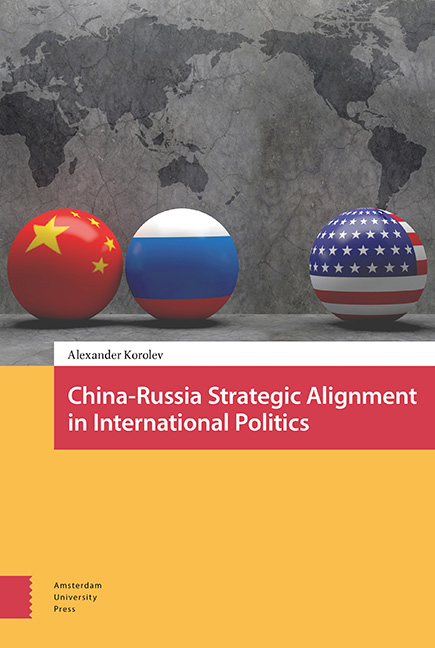Book contents
- Frontmatter
- Dedication
- Table of Contents
- List of Figures and Tables
- Acknowledgments
- 1 Introduction: The Elusive Nature of China–Russia Relations and the Need for Theory
- 2 The Ordinal Model of Strategic Alignment
- 3 Military Cooperation: Approaching Alliance
- 4 Alignment Incentives: The Three Balances
- 5 Robustness Check: Economy and Diplomacy
- 6 Comparative Mapping: US–India and China–Russia Alignments
- 7 Conclusion: Empirical Findings and Theoretical Implications
- Index
1 - Introduction: The Elusive Nature of China–Russia Relations and the Need for Theory
Published online by Cambridge University Press: 07 October 2022
- Frontmatter
- Dedication
- Table of Contents
- List of Figures and Tables
- Acknowledgments
- 1 Introduction: The Elusive Nature of China–Russia Relations and the Need for Theory
- 2 The Ordinal Model of Strategic Alignment
- 3 Military Cooperation: Approaching Alliance
- 4 Alignment Incentives: The Three Balances
- 5 Robustness Check: Economy and Diplomacy
- 6 Comparative Mapping: US–India and China–Russia Alignments
- 7 Conclusion: Empirical Findings and Theoretical Implications
- Index
Summary
Abstract
This chapter explores how the International Relations (IR) literature on alignments can help understand the case of China–Russia relations and how, in turn, the study of China–Russia relations can enrich the theoretical knowledge about alignments. The existing studies of China–Russia relations have failed to develop a theory-grounded system of indicators to measure China–Russia alignment. In turn, the IR literature does not have a ready-made, indicators-based taxonomy of alignments that could be applied to the China–Russia case. In this context, this chapter places a particular emphasis on the importance of theory for the comprehensive and systematic understanding of China–Russia alignment. It also presents the book structure, methodology, and research design that redefine China–Russia relations in theory-informed terms of strategic alignment and reconnect it with theoretical IR.
Keywords: China–Russia relations, international relations theory, alliance, Alignment
The rationale behind this book is two-fold. On the one hand, China–Russia strategic cooperation has displayed significant development and become an increasingly important factor in contemporary international politics, with considerable implications for both US–China and US–Russia relations. On the other hand, attempts to develop a theory-grounded framework and corresponding measurements that would allow an accurate and systematic assessment of the level of China–Russia strategic cooperation as well as its progress over time have been extremely scarce in the existing literature.
China–Russia strategic cooperation has progressed considerably and consistently since the end of the Cold War. According to official documents and statements, the relationship has progressed from “good neighborliness” in the early 1990s to “constructive cooperation” in the late 1990s to “comprehensive strategic partnership” in 2001, then further on to “comprehensive strategic partnership of coordination” in 2012 and to “comprehensive strategic partnership of equality, mutual trust, mutual support, common prosperity and long-lasting friendship” in 2016 (Korolev & Portyakov, 2019). A new upgrade took place on June 5, 2019, when Xi Jinping and Vladimir Putin declared China–Russia relations to be “a comprehensive strategic partnership of coordination for a new era,” which highlights consistent consolidation of China–Russia alignment, its immunity to exogenous shocks, and willingness on both sides to deal with the challenges of the future (Xinhua, 2019).
- Type
- Chapter
- Information
- Publisher: Amsterdam University PressPrint publication year: 2022



